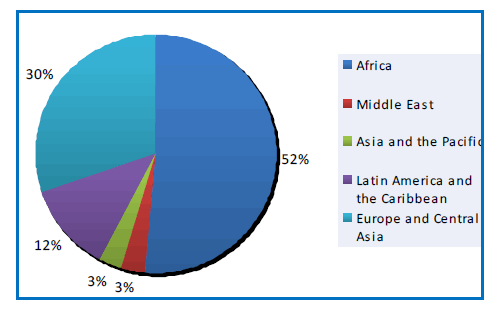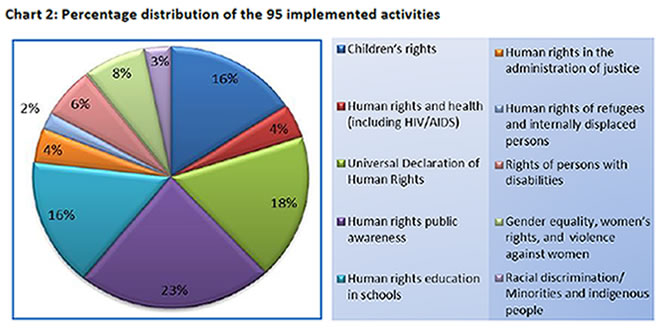6th phase (2008-2010) of the ACT Project
Assisting Communities Together Project
Sixth Phase (2008-2010)
Project Implementation Report
I. Introduction
The “Assisting Communities Together” (ACT) Project was initiated in 1998 by the Office of the United Nations High Commissioner for Human Rights (OHCHR), in cooperation with the United Nations Development Programme (UNDP), on the occasion of the fiftieth anniversary of the Universal Declaration of Human Rights. It makes available small grants to grass-roots organizations to carry out human rights education activities in local communities. The ACT Project is principally aimed at strengthening local capacities for human rights education, training and public information. Experience has shown that it has also contributed to bridging the gap between the international and local levels, as well as to improving the relationship between civil society and local and national authorities.
The present report provides an overview of activities carried out under the sixth phase of the ACT Project (2008 – 2010) and highlights the main results of the phase as concerns projects funded by OHCHR.
|
How does the ACT Project work? The overall administration of the ACT Project is coordinated by OHCHR headquarters in Geneva. For each phase (i.e. round of grants), OHCHR and UNDP jointly determine a list of participating countries in which grants will be awarded and the thematic focus of the human rights education projects to be supported. In each participating country, a local task force, comprising UNDP and OHCHR staff as well as other representatives of United Nations entities, organizes a local call for proposals, disseminates application forms and selects the activities to be funded. The task force is responsible for notifying the selected grantees and monitoring the implementation of the activities. The grantee enters into a grant agreement with the UNDP country office or with OHCHR (depending on the funding entity). The maximum grant per project is currently set at US$ 7,000, but may vary for each phase. The overall project budget can be higher if funds are available to applying organizations from other sources.
|
II. Project management and funding
Based on the expression of interest received from both OHCHR and UNDP Country Offices, 28 countries and territories (see list below) were selected by OHCHR headquarters and the UNDP Geneva Liaison Office to participate in the sixth phase of the Project. About 75 % of these countries had previously participated in the ACT Project. ACT grants were awarded for the first time in the following seven countries and territories: Azerbaijan, Côte d’Ivoire, Eritrea, Ghana, Kosovo, Seychelles and Zambia. OHCHR awarded grants in the 28 participating countries, UNDP awarded grants in 20 participating countries.

A total of 156 activities were selected for funding. Of these, 95 were funded by OHCHR, including 18 projects that benefited from a voluntary contribution (60,000 EUR) from the Government of the Republic of San Marino in support of local activities commemorating the 60th anniversary of the Universal Declaration of Human Rights (UDHR). OHCHR allocated a total of US$ 452,273.34 to the sixth phase (including the San Marino funds).
As in previous phases, local ACT Task Forces composed of United Nations staff, undertook the selection of activities at the local level. In addition, one UN staff in each participating country was designated as an “ACT Focal Point” to ensure follow-up and monitoring of activities, as well as the review of mid-term and final reports, before their final submission to OHCHR headquarters.
Chart 1: Percentage distribution of total funds

Table 1: Distribution of OHCHR funding by region (2008-2010)
|
Region |
Funds allocated (in US$) |
Percentage distribution of total funds |
Number of projects |
|
Africa |
231,885.50 |
51.3 |
50 |
|
Europe and Central Asia |
136,357.43 |
30.1 |
28 |
|
Latin America and the Caribbean |
54,070.41 |
12.0 |
11 |
|
Asia and the Pacific |
14,960.00 |
3.3 |
3 |
|
Middle East |
15,000.00 |
3.3 |
3 |
|
TOTAL |
452,273.34 |
100.0 |
95 |
Significantly represented among the beneficiaries of the sixth phase were children and youth with disabilities; youth living in rural regions, marginalised areas and poor localities; survivors of armed conflict; women and young girls; teachers and educators; parents and guardians; ethnic and cultural minorities; civil society actors – especially child rights activists; government officials; local leaders and community authorities; people living with HIV/AIDS; and others. Project activities focused largely on enhancing the participation of marginalized groups in public life through capacity building activities for those groups.
III. Thematic distribution of OHCHR-funded projects
The activities that received funding during the sixth phase focused on human rights education on development-related themes (e.g. basic human rights awareness-raising campaigns for rural women leaders and workshops on HIV/AIDS, human rights and development training programmes, etc.); on general educational initiatives (setting up human rights information centres, consultative mechanisms, discussion and debate fora and groups, etc.); and on fighting against discrimination based on sex, origin, culture, ethnicity, religious affiliation, and others.
The 95 project activities covered the following areas/issues (distribution provided in Table 2):
- Children’s rights
- Human rights and health (including HIV/AIDS)
- Universal Declaration of Human Rights
- Human rights public awareness
- Human rights education in schools
- Human rights in the administration of justice
- Human rights of refugees and internally displaced persons
- Human rights of persons with disabilities
- Gender equality, women’s rights, and violence against women
- Racial discrimination / Minorities and indigenous peoples

Table 2: Regional/thematic distribution of the 95 activities funded by OHCHR
|
Subject/theme |
Region |
Percentage of projects |
Number of projects |
|
Children’s rights |
Africa (9) |
15,78 |
15 |
|
Human rights and health (including HIV/AIDS) |
Africa (2) |
4,21 |
4 |
|
Universal Declaration of Human Rights |
Africa (9) |
17,89 |
17 |
|
Human rights public awareness |
Africa (10) |
23,15 |
22 |
|
Human rights education in schools |
Africa (10) |
15,78 |
15 |
|
Human rights in the administration of justice |
Africa (3) |
4,21 |
4 |
|
Human rights of refugees and internally displaced persons |
Europe and Central Asia (1) |
2,10 |
2 |
|
Rights of persons with disabilities |
Africa (1) |
6,31 |
6 |
|
Gender equality, women’s rights and violence against women |
Africa (6) |
7,36 |
7 |
|
Racial discrimination/Minorities and indigenous peoples |
Europe and Central Asia (3) |
3,15 |
3 |
The project reports have highlighted, among others, the following activities with positive outcomes:
- Broad human rights outreach through a variety of different channels: theatre plays, art, sport competitions, films and radio;
- Essay writing competitions encouraging the application of human rights concepts, such as inclusion;
- Human rights education and training activities reaching out an increasing number of stakeholders including children and their parents, academics, teachers, members of civil society, journalists, religious leaders, civil servants, members of political parties and others;
- The establishment of human rights education clubs in schools and libraries;
- The production of human rights information materials in simplified language or in indigenous languages;
- In the context of the 60th anniversary of the UDHR, the dissemination of the UDHR through translation in rare languages and dialects and in a simplified format for children;
- In primary and secondary schools, youth training programmes - with the trainees serving as “peer educators”; and
- The incorporation of human rights and children’s rights in the civic education school programmes.
The seventh phase of the ACT Project increased awareness on human rights among a variety of audiences, through numerous different means and forms. It also contributed to the strengthening of local capacities related to human rights education, training and public information. As reported by UN colleagues in the field and by grant recipients, it also achieved the following objectives:
- Contributing towards the improvement of the human rights record at the local and national levels;
- Creating linkages between the international and the local levels;
- Enhancing the relationship between civil society and local or national authorities;
- Further building and enhancing cooperation between civil society and the local United Nations presence.
All reference to Kosovo, whether to the territory, institutions or population, in this text shall be understood in full compliance with United Nations Security Council Resolution 1244 and without prejudice to the status of Kosovo.
Report on implementation of activities by themes, summaries by country and regional distribution of projects.